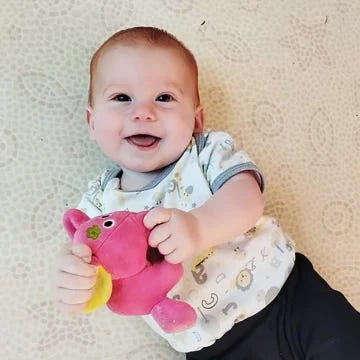Israel Awaits News on the Fate of Hamas' Youngest Hostage, a Toddler Taken as a Baby
“The uncertainty is unbearable. Sometimes I just want to scream,” said Kfir Bibas' aunt to NBC News.
TEL AVIV — Across Israel, posters of a smiling, red-headed baby boy clutching a pink elephant can be seen on lampposts, shop windows, and smartphones. This image is of Kfir Bibas, the youngest hostage still in captivity in Gaza, who was just under nine months old when he was kidnapped during the Hamas-led attack on October 7, 2023. Now, as the boy turns two, his fate remains unknown.
Kfir, alongside his older brother Ariel, 5, and their parents, Yarden and Shiri Bibas, is among the 33 hostages expected to be freed in the first phase of the ceasefire deal, according to the Israeli government. However, there is uncertainty surrounding whether the toddler is still alive.
“Not knowing is so hard that sometimes I just want to scream,” Kfir’s aunt, Ofri Bibas-Levy, shared with NBC News earlier this week. “Just tell me, even if it’s the worst thing.”
The Bibas family’s last known footage was taken near their home in the kibbutz of Nir Oz, where Shiri Bibas, holding her two sons, looked terrified as they were marched by armed gunmen in Gaza’s southern city of Khan Younis. That footage would be the last sighting of them, and no updates have emerged since.
Although all other child hostages were released in a brief ceasefire in November 2023, the Bibas family remained in Gaza. In the final days of the ceasefire, Hamas issued a statement claiming that Shiri and the children had been killed in an Israeli airstrike, with Yarden Bibas allegedly still alive in captivity. However, Israel’s military could not confirm this claim at the time. By February 2024, Israel expressed grave concern for the family’s well-being.
“We are very concerned about the condition and safety of Shiri and the children,” Rear Adm. Daniel Hagari, the spokesperson for the Israel Defense Forces, stated in February 2024.
Now, as the Bibas family holds on to the hope that their ordeal may soon end, they also face the fear that the truth could be far worse. Ofri Bibas-Levy shared her mixed emotions: “We know this ceasefire could bring us some kind of certainty, but we are terrified as well.”
The 38-year-old occupational therapist expressed her worry, particularly for Kfir, stating, “It’s so difficult for a toddler and a baby in captivity. Even if they survived the attack, we know how the hostages are being kept. We’re incredibly worried.”
Kfir’s father, Yarden Bibas, was kidnapped separately from his family and held in a different area of Gaza. According to other freed hostages, Yarden was informed by Hamas of the deaths of his wife and children. His emotional response was captured on video, and his sister-in-law, Ofri, feared for his survival.
Despite this, there is a small glimmer of hope. Yarden Bibas, too, is expected to be freed in the first phase of the ceasefire deal, which began Sunday after more than 15 months of conflict. More than 47,000 lives have been lost in Gaza, and 1,200 people in Israel have been killed since the onset of the war, which began with Hamas’ multi-pronged attack on Israel, during which approximately 250 people were taken hostage.
Ofri Bibas-Levy shared her daily torment, saying she thinks of her younger brother every moment: “I don’t know if he’s alive or dead, if he’s eaten, if he’s been tortured. I don’t know anything.”
At the Hostage Square in Tel Aviv, where families of the captives have gathered for over a year, many brought stuffed animals to honor Kfir on his second birthday, echoing the pink elephant he holds in his hostage poster. The family had searched through the wreckage of their home in Nir Oz for Kfir’s elephant, but it wasn’t found—until, just days before the ceasefire, it unexpectedly turned up in the corner of a nursery.
“It was really emotional,” Bibas-Levy said, “and hopefully a good sign, maybe.”


